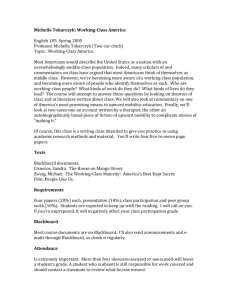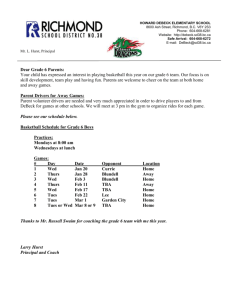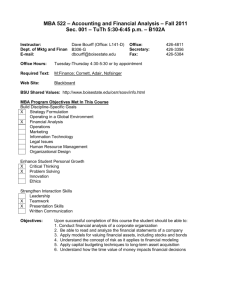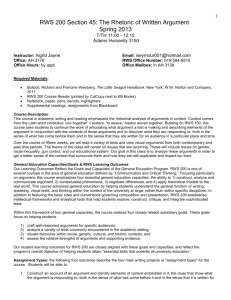2013.005 - Dodwell
advertisement
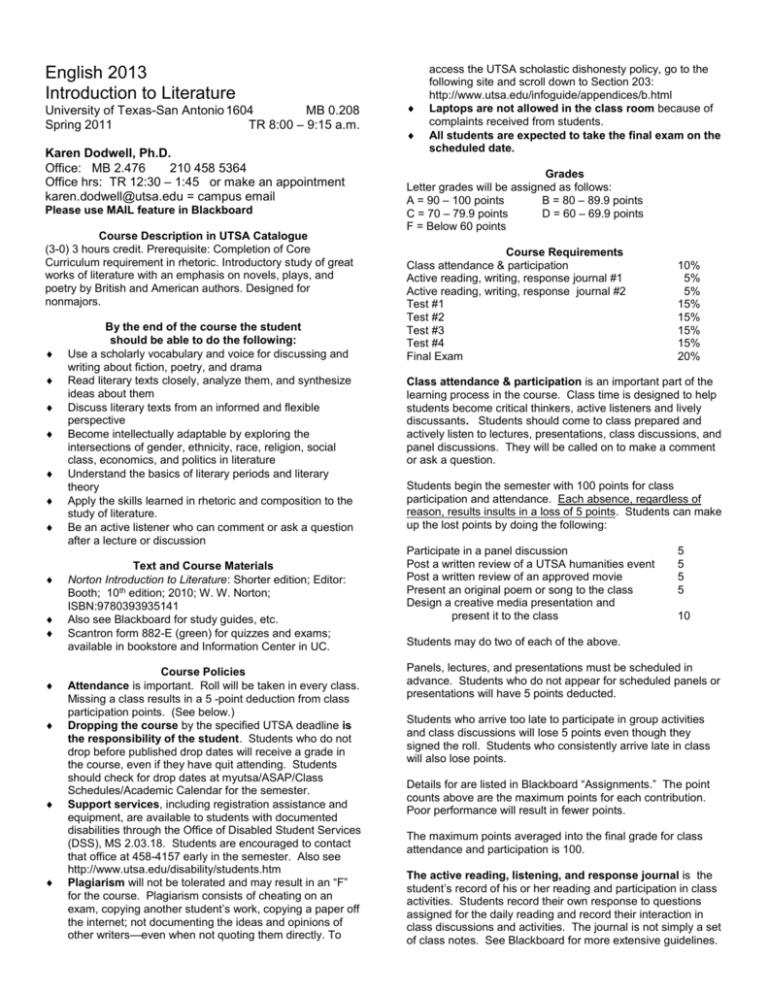
English 2013 Introduction to Literature University of Texas-San Antonio 1604 MB 0.208 Spring 2011 TR 8:00 – 9:15 a.m. Karen Dodwell, Ph.D. Office: MB 2.476 210 458 5364 Office hrs: TR 12:30 – 1:45 or make an appointment karen.dodwell@utsa.edu = campus email Please use MAIL feature in Blackboard Course Description in UTSA Catalogue (3-0) 3 hours credit. Prerequisite: Completion of Core Curriculum requirement in rhetoric. Introductory study of great works of literature with an emphasis on novels, plays, and poetry by British and American authors. Designed for nonmajors. By the end of the course the student should be able to do the following: Use a scholarly vocabulary and voice for discussing and writing about fiction, poetry, and drama Read literary texts closely, analyze them, and synthesize ideas about them Discuss literary texts from an informed and flexible perspective Become intellectually adaptable by exploring the intersections of gender, ethnicity, race, religion, social class, economics, and politics in literature Understand the basics of literary periods and literary theory Apply the skills learned in rhetoric and composition to the study of literature. Be an active listener who can comment or ask a question after a lecture or discussion Text and Course Materials Norton Introduction to Literature: Shorter edition; Editor: Booth; 10th edition; 2010; W. W. Norton; ISBN:9780393935141 Also see Blackboard for study guides, etc. Scantron form 882-E (green) for quizzes and exams; available in bookstore and Information Center in UC. Course Policies Attendance is important. Roll will be taken in every class. Missing a class results in a 5 -point deduction from class participation points. (See below.) Dropping the course by the specified UTSA deadline is the responsibility of the student. Students who do not drop before published drop dates will receive a grade in the course, even if they have quit attending. Students should check for drop dates at myutsa/ASAP/Class Schedules/Academic Calendar for the semester. Support services, including registration assistance and equipment, are available to students with documented disabilities through the Office of Disabled Student Services (DSS), MS 2.03.18. Students are encouraged to contact that office at 458-4157 early in the semester. Also see http://www.utsa.edu/disability/students.htm Plagiarism will not be tolerated and may result in an “F” for the course. Plagiarism consists of cheating on an exam, copying another student’s work, copying a paper off the internet; not documenting the ideas and opinions of other writers—even when not quoting them directly. To access the UTSA scholastic dishonesty policy, go to the following site and scroll down to Section 203: http://www.utsa.edu/infoguide/appendices/b.html Laptops are not allowed in the class room because of complaints received from students. All students are expected to take the final exam on the scheduled date. Grades Letter grades will be assigned as follows: A = 90 – 100 points B = 80 – 89.9 points C = 70 – 79.9 points D = 60 – 69.9 points F = Below 60 points Course Requirements Class attendance & participation Active reading, writing, response journal #1 Active reading, writing, response journal #2 Test #1 Test #2 Test #3 Test #4 Final Exam 10% 5% 5% 15% 15% 15% 15% 20% Class attendance & participation is an important part of the learning process in the course. Class time is designed to help students become critical thinkers, active listeners and lively discussants. Students should come to class prepared and actively listen to lectures, presentations, class discussions, and panel discussions. They will be called on to make a comment or ask a question. Students begin the semester with 100 points for class participation and attendance. Each absence, regardless of reason, results insults in a loss of 5 points. Students can make up the lost points by doing the following: Participate in a panel discussion Post a written review of a UTSA humanities event Post a written review of an approved movie Present an original poem or song to the class Design a creative media presentation and present it to the class 5 5 5 5 10 Students may do two of each of the above. Panels, lectures, and presentations must be scheduled in advance. Students who do not appear for scheduled panels or presentations will have 5 points deducted. Students who arrive too late to participate in group activities and class discussions will lose 5 points even though they signed the roll. Students who consistently arrive late in class will also lose points. Details for are listed in Blackboard “Assignments.” The point counts above are the maximum points for each contribution. Poor performance will result in fewer points. The maximum points averaged into the final grade for class attendance and participation is 100. The active reading, listening, and response journal is the student’s record of his or her reading and participation in class activities. Students record their own response to questions assigned for the daily reading and record their interaction in class discussions and activities. The journal is not simply a set of class notes. See Blackboard for more extensive guidelines. Tests and the final exam are designed to assess the student’s retention of information and critical thinking. The tests will be taken in class and may contain brief identification, multiple choice, short essays and long essays. The final is comprehensive. Reading Schedule Fiction Tues Jan 11 - Introduction to the course, to literature, and to plot structure. Thurs Jan 13 PLOT - Read pp. 46 – 58; also read “The Jewelry” by Guy de Maupassant, pp. 58-63. Come to class prepared to respond to questions #1, 2, and 3 on page 63. Tues Jan 18 - NARRATION & POV – Read pp. 96 – 100. Read three stories, “Hills Like Elephants,” by Ernest Hemingway, “How” by Lorrie Moore and “Girl” by Jamaica Kinkaid. Come to class prepared to discuss the the narrative voice in the stories. Use the terminology used to discuss narrative voice on pg 96-100. Thurs Jan 20 – CHARACTER – Read pages 119 – 126. Read “Recitatif” by Toni Morrison. Come to class prepared to answer questions #1, 2, and 3 on page 152. Tues– Jan 25 – SETTING – Read pp. 163-169. Read Amy Tan’s “A Pair of Tickets”. Come prepared to answer questions #1, 2 and 3 on page 202. Thurs Jan 27 – SYMBOL & FIGURATIVE LANGUAGE. Read pp. 208 – 213. Also Read “A Wall of Fire Rising” by Edwidge Danticat. Come prepared to answer questions 1, 2, and 3 on page 249. Tues – Feb 1 TEST #1; bring a Scantron form Thurs – Feb 3 THEME – Read pp. 251- 254. Read Lois Erdrich “Love Medicine.” Come prepared to answer questions1, 2, and 3 on page 290. Tues Feb 8 – FLANNERY O’CONNOR. Read pp. 294299. Also read “Good Country People” Analyze the title of the story. What does it mean relative to the story? Who are the “good country people”? Is the title ironic? Poetry Thurs Feb 10 - Introduction. Read pp. 618 – 636) Tues Feb 15 THEME AND TONE – Read pp. 651 – 662. Come prepared to discuss the theme and tone of one of the poems in the assigned reading. Thurs Feb 17 Test #2 in class; bring Scantron form Tues Feb 22 LANGUAGE – Read pp. 730 – 746. Come prepared to answer the question about “Ode to American English”, p. 746: “What qualities does Hamby’s poem attribute to American English? How is each quality illustrated by the way she uses that language in the poem?” Thurs Feb 24 LANGUAGE – Read pp. 746-772. Come prepared to respond to the question at the end of “Dulcet et Decorum Est,” “Diving into the Wreck” and “Wedding-Ring.” Journal #1 due on Blackboard Tues Mar 1 - SOUNDS – Read pp. 773 – 785. Thurs Mar 3 – INTERNAL STRUCTURE and EXTERNAL FORM – Read pp. 801-812 and 824- 850 Also see p 920. Analyze the structure and form of the poem “Sympathy” by Paul Lawrence Dunbar on page 1014. Use the terms in the reading in your analysis. Tues Mar 8 - Test #3 in class; bring a Scantron form Thurs Mar 10 – HARLEM RENAISSANCE Read pp. 947 – 964. What is your favorite poem in the reading for today? Be able to explain why. March 14 – 18 – Spring Break! Enjoy! Tues Mar 22 HARLEM RENAISSANCE Read pp. 964981. Be able to discuss issues raised in prompts 5 and 6 on page 981 Thurs Mar 24 – No class; go to COLFA conference session Drama and Critical Approaches Tues Mar 29 Introduction to critical approaches. Skim pages 1818 -1843. Pay close attention to psychoanalytic criticism (including Freudian, Jungian, myth and Lacanian) and to feminist, gender, and queer theory Thurs Mar 31 – Midsummer Nights Dream. Read pp. 1245 – 1260 (Intro to Shakespeare and Act 1). How are men and women represented in the first Act? Tues Apr 5 Midsummer Night’s Dream, Acts 2 – 3. Use feminist, gender and queer theory to analyze the two acts. Thurs Apr 7 Midsummer Night’s Dream, Acts 4 – 5. Use feminist, gender and queer theory to analyze the two acts. Friday Apr 8 Last day for movie review postings due in Blackboard Tues Apr 12 Test #4 in class; bring a Scantron form Thurs Apr 14 - A Streetcar Named Desire, scenes 1 - 3 Use psychological criticism to analyze the play Tues Apr 19 – A Streetcar Named Desire, scenes 4 – 8 Use psychological criticism to analyze the play Thurs Apr 21 – A Streetcar Named Desire, scenes 9 – 11 Use psychological criticism to analyze the play Friday Apr 22 – Last day for humanities event postings in Blackboard Tues, Apr 26 – Review for comprehensive final exam. Journal #2 due in Blackboard Final Exam – Thursday, May 5 room Bring Scantron 7:30 – 10:00 same



